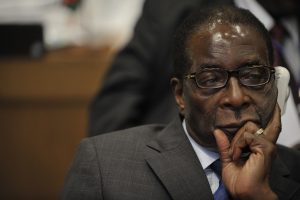Recent unrest in Zimbabwe has been unpredictable, but not unforeseen. Robert Mugabe, the now the country’s former president, long dominated the Zimbabwean political sphere with his divisive and authoritarian perspectives and politics. However, with his recent resignation and the reshuffling of the government, there is a tangible absence at the government’s helm. With the ascension of the former vice president, Emmerson Mnangagwa, to Mugabe’s former role, the populace’s excitement for a new era is palpable. Regardless, there remains uncertainty about how the shadow of Mugabe and his associates will affect a possible democratic transition and its outcomes.
Mugabe’s influence has not vanished; even though he has resigned, Mugabe will continue to play a role in Zimbabwean policies, providing direction as an elder statesman. Already, it is apparent that Mugabe’s advice and prescribed visions for Zimbabwe will be well-received by President Mnangagwa, who says of Mugabe, “he’s my father, he’s my leader, he’s my mentor.” Thus, the impacts of Mugabe’s controversial—and often self-serving—politics, while softened by his descent from power, will be pervasive in the coming years.
The origin of the most recent unrest can be traced back to Mugabe’s attempt to position his wife, Grace Mugabe, as his successor, by ousting then-vice president Mnangagwa. Due to intervention by the military, the attempt was unsuccessful, but it did not help Grace Mugabe’s divisive image. As Robert Mugabe has aged, Grace Mugabe has grown increasingly politically potent, abusing her power often to fuel extravagant habits. Interestingly, Grace Mugabe has often drawn more disgruntlement from the general public than Robert Mugabe has. The uproar following Mugabe’s attempts to orchestrate his wife’s ascension to his role only confirms this sentiment. While Robert Mugabe’s future role has been set, Grace Mugabe is avoiding the public eye, likely fearing for her physical safety. Given recent events, it is clear that the population is strongly opposed to another Mugabe ruling Zimbabwe. However, while this rejection of the Mugabe name is clear, the disappearance of the Mugabe influence is not a certainty.
Mnangagwa is now at the helm, but his dark past and his association with Mugabe leave many questions about his leadership and its effects on Zimbabwe’s future. Mnangagwa, also known as “the Crocodile” for his political shrewdness, lacks the charisma of his mentor; however, his skillful political maneuverability makes up for this perceived gap. Mnangagwa has long been indicated as Mugabe’s likely successor, given his strong ties to him and illustrious political career. In his first public speech since being fired by Mugabe in early November, President Mnangagwa promised “full democracy” for Zimbabwe. However, this promise is not only lofty, but also questionable given Mnangagwa’s track record.
Mnangagwa’s name is associated with atrocities committed under the ruling Zanu-PF party since 1980, the year Zimbabwe gained independence. Mnangagwa played a key role in Zimbabwe’s war of independence in the 1960s and 1970s, for which many remember him positively. However,as a spymaster during the conflicts of the 1980s, his name was linked to the massacre of thousands of civilians. Despite the many witnesses to his involvement, Mnangagwa has distanced himself from such accusations, and instead sought to pin the massacres on the military.
Mnangagwa’s attempts at influencing the direction of Zimbabwe have even been seen in recent elections. In 2008, Mnangagwa is said to have played a role in a violent campaign to force the opposition candidate, Morgan Tsvangirai, to step down. Thus, Mnangagwa’s rumored association with despotic methods and violent acts creates uncertainty about how much his rule will vary from that of his predecessor. Mnangagwa’s strong ties with the military, which forced the ousting of Mugabe, may also lend him more power to realize an authoritarian vision. This track record gives credence to fears for Zimbabwe’s future.
Nonetheless, Mnangagwa’s optimism for Zimbabwe is infectious. The population cheered on his speech, as Mnangagwa spoke of economic growth and job creation. It is apparent that the Zimbabwean population is tired of the greed and corruption of the Mugabe era. To Zimbabweans, the removal of the Mugabe name is an exciting signal of possible democracy in the coming years. Such optimism and enthusiasm is inevitable given the discontent with the Mugabe decades. However, Mugabe and his influences are not gone. Moreover, Mnangagwa’s political cunningness and violent past may also serve to derail a smooth democratic transition. Zimbabwe is wise to continue being wary of Mugabe’s shadow.
Image Credit: US Navy/Wikimedia Commons
